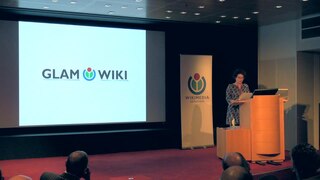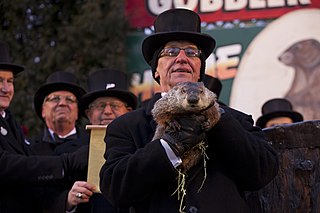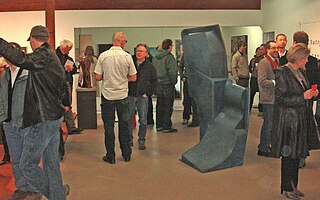Related Research Articles

Public speaking, also called oratory, is the act or skill of delivering speeches on a subject before a live audience.

In academic publishing, a scientific journal is a periodical publication intended to further the progress of science, usually by sharing findings from research with readers. They are normally specialized based on discipline, with authors picking which one they send their manuscripts to.

A ghostwriter is a person hired to write literary or journalistic works, speeches, or other texts that are putatively credited to another person as the author. Celebrities, executives, participants in timely news stories, and political leaders often hire ghostwriters to draft or edit autobiographies, memoirs, magazine articles, or other written material.

Bribery is the offering, giving, receiving, or soliciting of any item of value to influence the actions of an official, or other person, in charge of a public or legal duty. With regard to governmental operations, essentially, bribery is "Corrupt solicitation, acceptance, or transfer of value in exchange for official action." Gifts of money or other items of value that are otherwise available to everyone on an equivalent basis, and not for dishonest purposes, are not bribery. Offering a discount or a refund to all purchasers is a legal rebate and is not bribery. For example, it is legal for an employee of a Public Utilities Commission involved in electric rate regulation to accept a rebate on electric service that reduces their cost of electricity, when the rebate is available to other residential electric customers. However, giving a discount specifically to that employee to influence them to look favorably on the electric utility's rate increase applications would be considered bribery.

Academic publishing is the subfield of publishing which distributes academic research and scholarship. Most academic work is published in academic journal articles, books or thesis. The part of academic written output that is not formally published but merely printed up or posted on the Internet is often called "grey literature". Most scientific and scholarly journals, and many academic and scholarly books, though not all, are based on some form of peer review or editorial refereeing to qualify texts for publication. Peer review quality and selectivity standards vary greatly from journal to journal, publisher to publisher, and field to field.

Open access (OA) is a set of principles and a range of practices through which research outputs are distributed online, free of access charges or other barriers. With open access strictly defined, or libre open access, barriers to copying or reuse are also reduced or removed by applying an open license for copyright.

A keynote in public speaking is a talk that establishes a main underlying theme. In corporate or commercial settings, greater importance is attached to the delivery of a keynote speech or keynote address. The keynote establishes the framework for the following programme of events or convention agenda; frequently the role of keynote speaker will include that of convention moderator. It will also flag up a larger idea—a literary story, an individual musical piece, or event.
The science wars were a series of scholarly and public discussions in the 1990s over the social place of science in making authoritative claims about the world. Encyclopedia.com, citing the Encyclopedia of Science and Religion, describes the science wars as the
A scientific celebrity or celebrity scientist or public scientist is a scientist who has gained significant public attention, usually through the media. For the general public, scientific celebrities serve to represent science or a field of science. In some instances this can be self-serving in nature or can be at the behest of governmental or corporate interests or to promote the science involved.

TED Conferences, LLC is an American-Canadian non-profit media organization that posts international talks online for free distribution under the slogan "ideas worth spreading". It was founded by Richard Saul Wurman and Harry Marks in February 1984 as a technology conference, in which Mickey Schulhof gave a demo of the compact disc that was invented in October 1982. Its main conference has been held annually since 1990. It covers almost all topics—from science to business to global issues—in more than 100 languages.
SCIgen is a paper generator that uses context-free grammar to randomly generate nonsense in the form of computer science research papers. Its original data source was a collection of computer science papers downloaded from CiteSeer. All elements of the papers are formed, including graphs, diagrams, and citations. Created by scientists at the Massachusetts Institute of Technology, its stated aim is "to maximize amusement, rather than coherence." Originally created in 2005 to expose the lack of scrutiny of submissions to conferences, the generator subsequently became used, primarily by Chinese academics, to create large numbers of fraudulent conference submissions, leading to the retraction of 122 SCIgen generated papers and the creation of detection software to combat its use.

An academic conference or scientific conference is an event for researchers to present and discuss their scholarly work. Together with academic or scientific journals and preprint archives, conferences provide an important channel for exchange of information between researchers. Further benefits of participating in academic conferences include learning effects in terms of presentation skills and “academic habitus”, receiving feedback from peers for one's own research, the possibility to engage in informal communication with peers about work opportunities and collaborations, and getting an overview of current research in one or more disciplines.

A media event, also known as a pseudo-event, is an event, activity, or experience conducted for the purpose of media publicity. It may also be any event that is covered in the mass media or was hosted largely with the media in mind.
The World Academy of Science, Engineering and Technology or WASET is a predatory publisher of open access academic journals. The publisher has been listed as a "potential, possible, or probable" predatory publisher by American library scientist Jeffrey Beall and is listed as such by the Max Planck Society and Stop Predatory Journals. WASET's estimated annual revenue in 2017 alone was over $4 million, with other estimates ranging from $8.9 million to $11.9 million for the years 2014 to 2019 combined.
A speakers bureau is a collection of speakers who talk about a particular subject, or a company, which operates to facilitate speakers for clients requiring motivational speakers, celebrity appearances, conference facilitators, or keynote speakers.
Academic journal publishing reform is the advocacy for changes in the way academic journals are created and distributed in the age of the Internet and the advent of electronic publishing. Since the rise of the Internet, people have organized campaigns to change the relationships among and between academic authors, their traditional distributors and their readership. Most of the discussion has centered on taking advantage of benefits offered by the Internet's capacity for widespread distribution of reading material.

OMICS Publishing Group is a predatory publisher of open access academic journals. It started publishing its first journal in 2008. By 2015, it claimed over 700 journals, although about half of them were defunct. Its subsidiaries and brands include Allied Academies, Conference Series LLC LTD, EuroSciCon LTD, Hilaris Publishing, iMedPub LTD, Longdom Publishing SL, Meetings International, Pulsus Group, Research & Reviews, SciTechnol, Trade Science Inc, and Life Science Events.
ResearchGate is a European commercial social networking site for scientists and researchers to share papers, ask and answer questions, and find collaborators. According to a 2014 study by Nature and a 2016 article in Times Higher Education, it is the largest academic social network in terms of active users, although other services have more registered users, and a 2015–2016 survey suggests that almost as many academics have Google Scholar profiles.
Scientific dissent is dissent from scientific consensus. Disagreements can be useful for finding problems in underlying assumptions, methodologies, and reasoning, as well as for generating and testing new ways of tackling the unknown. In modern times, with the increased role of science on the society and the politicization of science, a new aspect gained prominence: effects of scientific dissent on public policies.

An autograph show is an event where the public, mostly autograph collectors or fans of an attending celebrity, gather to collect autographs from someone famous who attends to meet fans and sign items for them. Some autograph shows are part of a larger, comicon event, while others can be part of a specific event, such as the Super Bowl weeks' activities.
References
- ↑ Morgan, Nick. "How Much Can You Charge For Speaking?". Forbes. Retrieved 2 December 2014.
- ↑ Poe, Curtis. "How Do Conference Speakers Get Compensated?". LinkedIn. Retrieved 2 December 2014.
- ↑ Mack, Alison. "Scientific Success Often Leads To Paid Public-Speaking Engagements". The Scientist. Retrieved 2 December 2014.
- ↑ Chen, Henry (2020-11-05). "Fees to speakers: academic exchange or commercial bribery - Anti-Bribery & Fraud-The Compliance Reviews". www.compliancereviews.cn. Retrieved 2021-09-22.